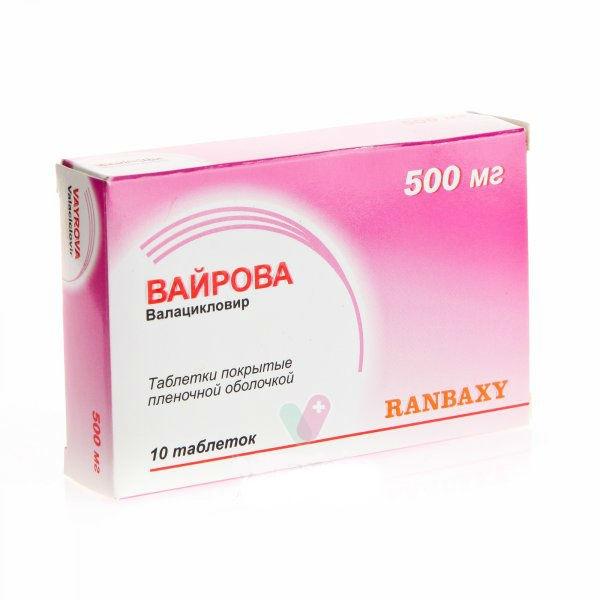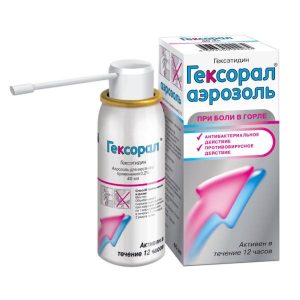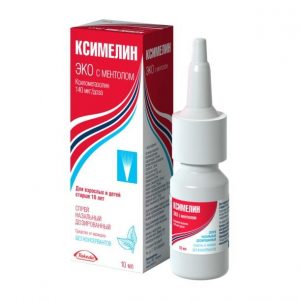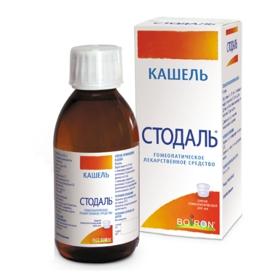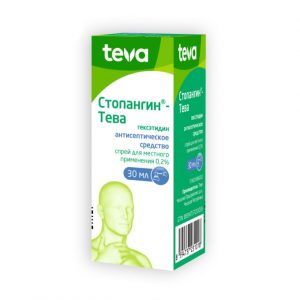Description
Release form
Film-coated tablets.
packaging 10 pcs
The pharmacological action of Vairova
is a nucleoside inhibitor of the herpes virus DNA polymerase.
Blocks viral DNA synthesis and virus replication.
In the human body, it turns into acyclovir and L-valine as a result of phosphorylation of active acyclovir triphosphate from acyclovir, which competitively inhibits viral DNA polymerase.
The first phase of phosphorylation occurs under the influence of a virus-specific enzyme (for Herpes simplex types 1 and 2, Varicella zoster is a viral thymidine kinase that is found only in cells infected with the virus).
More active against Herpes simplex than Varicella zoster.
Indications
In adults:
herpes of the lips, genital herpes (primary and recurrent infection, long-term suppressive therapy of recurrent genital herpes in people with immunodeficiency, including HIV infection, reducing the risk of transmission of the infection to the sexual partner), girdle.
In adults and children over 12 years of age:
prophylaxis of cytomegalovirus infection during organ transplantation.
Contraindications
Hypersensitivity, HIV infection with a CD4 + lymphocyte count of less than 100 / μl, children (up to 12 years old with CMV, up to 18 years old according to other indications).
Caution. Hepatic / renal failure, old age, hypohydration, concomitant use of nephrotoxic drugs, pregnancy, lactation, childhood.
Special instructions
Elderly patients, people with dehydration during treatment should increase their fluid intake (risk of developing acute renal failure).
In the treatment of genital herpes, sexual contact should be avoided, as the drug does not protect against transmission.
Taking the drug in high doses for a long time in conditions accompanied by severe immunodeficiency (bone marrow transplantation, clinically expressed forms of HIV infection, kidney transplantation), led to the development of thrombocytopenic purpura and hemolytic-uremic syndrome, up to a fatal outcome.
In case of side effects from the central nervous system (including agitation, hallucinations, confusion, delirium, seizures and encephalopathy) the drug is canceled.
Composition
1 tablet contains 500 mg valaciclovir.
Dosing and Administration Vairov
is taken orally, regardless of food intake.
Adults, including with CRF and CC less than 50 ml / min / 1.73 sq.m: for cold sores of the lips (treatment begins when tingling, itching or burning) – 2 g every 12 hours, with CC 30-49 – 1 g every 12 hours, with KK 10-29 – 500 mg every 12 hours, with KK less than 10 – 500 mg once. The course of treatment is 1 day
with primary genital herpes (including with KK 30-49 ml / min / 1.73 sq.m) – 1 g 2 times a day, with KK 10-29 – 1 g every 24 h, with CC less than 10 – 500 mg every 24 hours. The course of treatment is 10 days
with recurrent genital herpes (including CC 30-49 ml / min / 1.73 sq.m) – 500 mg 2 times per day, with CC less than 30 – 500 mg every 24 hours. The course of treatment is 3 days. Treatment begins with the first signs or symptoms of
recurrence with prolonged suppressive therapy of recurrent genital herpes in people with immunodeficiency, including HIV infection – 1 g per day (including with CC 30-49), with CC less than 30 – 500 mg every 24 hours, with a relapse rate of less than 9 per year, it is possible to use (including with KK 30-49) – 500 mg per day, with KK less than 30 – 500 mg every 48 hours, in HIV-infected patients with the number of CD4 + cells more than 100 / μl (including with KK 30-49) – 500 mg 2 times a day, with KK less than 30 – 500 mg every 24 hours
to reduce the risk of transmission infections to the sexual partner with the number of relapses less than 9 per year, the sexual partner is prescribed 500 mg once a day.
with herpes zoster – 1 g every 8 hours for 7 days (treatment begins within 48 hours after the rash appears), with KK 30-49 – 1 g every 12 hours, with KK 10-29 – 1 g every 24 hours, with CC less than 10 – 500 mg every 24 hours.
Adults and children over 12 years of age, including with CRF and CC less than 75 ml / min / 1.73 sq.m: prevention of CMV infection during organ transplantation – 2 g 4 times a day with CC 50-75 – 1.5 g 4 times a day with CC 25-50 – 1.5 g 3 times a day with CC 10-25 – 1.5 g 2 times a day with CC less than 10 and patients those on hemodialysis – 1.5 g once a day. The course of treatment is 90 days. Take the drug as soon as possible after transplantation.
In patients undergoing hemodialysis, the drug is administered after the hemodialysis procedure. T1 / 2 in such patients – 4 hours during the 4-hour procedure, 30% of the drug is removed. With peritoneal dialysis, the drug is removed to a lesser extent, other pharmacokinetic parameters remain the same.
Side effects of the
From the digestive system: nausea, abdominal pain, vomiting, diarrhea, increased activity of ALT, AST, alkaline phosphatase, hepatitis.
On the part of the nervous system: headache, dizziness, depression, aggressive behavior, agitation, ataxia, coma, confusion or depression of consciousness, dysarthria, encephalopathy, mania, psychosis, including auditory and visual hallucinations, convulsions, tremors.
On the part of the sensory organs: impaired vision.
From the urinary system: pain in the projection of the kidneys, acute renal failure.
From the hemopoietic organs: neutropenia, thrombocytopenia, aplastic anemia, leukoclastic vasculitis, thrombotic thrombocytopenic purpura.
From the skin: erythema multiforme, rash, photosensitivity, alopecia.
Allergic reactions: angioedema, shortness of breath, itching, rash, urticaria, anaphylactic reactions.
Laboratory readings: Hb reduction, hypercreatininemia.
Other: dysmenorrhea, arthralgia, nasopharyngitis, respiratory tract infections, swelling of the face, increased blood pressure, tachycardia, fatigue additionally in children – fever, dehydration, rhinorrhea.
Drug Interactions
Cimetidine and tubular secretion blockers reduce the effect (decrease the rate, but not the fullness of conversion to acyclovir). In individuals with normal CC, correction of the dosage regimen is not required.
Nephrotoxic drugs (including cyclosporine, tacrolimus) increase the risk of nephrotoxicity.
Overdose
Symptoms: Acyclovir may be deposited in the renal tubules, with the development of acute renal failure and anuria.
Treatment: hemodialysis.
Storage conditions
The product should be stored out of reach of children at a temperature not exceeding 25 ° C.
active substance
Valaciclovir
lekarstvennaja form
tablets
For prescription by
doctor, For children prescribed by a doctor, Children over 12 years old
Indications
Indications
Chickenpox, Common cold, herpes, Cytomegalovirus
Ranbaksi Laboratoriz Limited, India
